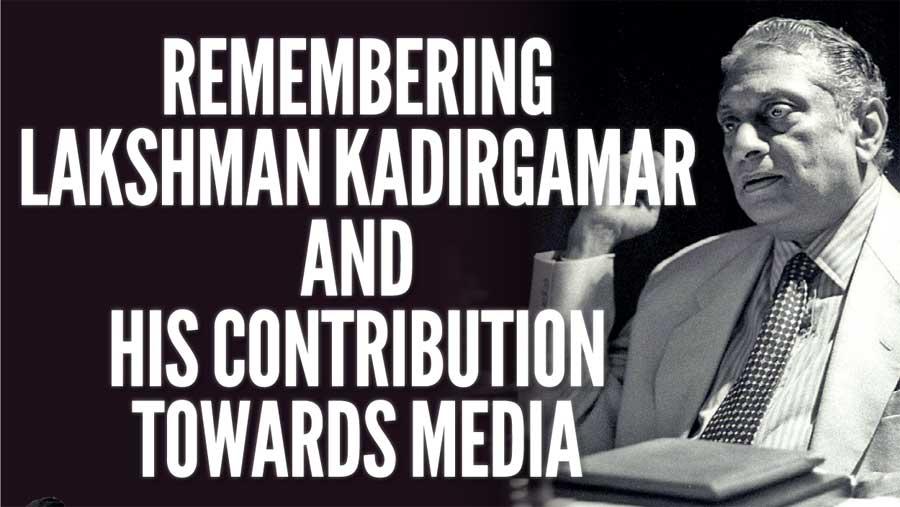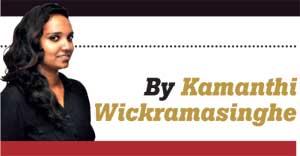12 Aug 2019 - {{hitsCtrl.values.hits}}

- The Commonwealth media saw in Mr. Kadirgamar, someone in whom they could trust and depend on to see it through for five years
- One of his earliest orders as Media Minister was for the State Media to give the Opposition air time
- He, himself was the victim of scurrilous attacks by sections of the media with agendas
- Lakshman Kadirgamar Institute of International Relations and Strategic Studies, was founded a year after his assassination
Much has been spoken and written, and much has been left unsaid about the late Foreign Minister Lakshman Kadirgamar, a great son of Sri Lanka the country unfortunately lost. Although a bullet took his life 14 years ago, his legacy has lives. 
As a recipient of the Lakshman Kadirgamar Journalism Scholarship, awarded by the Lakshman Kadirgamar Foundation, I thought of penning down a few words to commemorate his death anniversary which falls today (August 12). It is a scholarship given in his memory. The scholars are young Sri Lankan journalists picked from the Journalism Awards for Excellence programme – organized by the Editors’ Guild of Sri Lanka in partnership with the Sri Lanka Press Institute. All recipients of the Denzil Peiris Young Reporter Award are sent to undergo advanced training at the Manorama School of Communication(MASCOM), one of India’s most prestigious journalism academies headed by the acclaimed Prof. Thomas Oomen. The owners of MASCOM are the Mathew family who run one of India’s largest newspaper publishing houses, Malayala Manorama and give this scholarship for their regard to Kadirgamar.
Hence, I thought I would write on Mr. Kadirgamar’s contribution to journalism and how I benefitted both, personally and professionally from a scholarship given by a foreign media house in the late Minister’s memory.
"He was known for his expertise on international relations have shown the true spirit of a humanitarian by supporting a free media movement and his legacy is one that needs to be carried on for generations to come"
Mr. Kadirgamar’s stellar performance as the country’s Foreign Minister (1994-2001 and 2004-2005) eclipses the fact that he was made Media Minister in 2004 for a brief period. One of his earliest orders as Media Minister was for the State Media to give the Opposition air time.
He was a great advocate of a free press and when national newspaper editors were being dragged to court and prosecuted on charges of criminal defamation, he was a silent dissenter within his own government. Other power-hungry Ministers egged the then President Chandrika Kumaratunga to teach these editors, and some publishers a lesson and ensure they towed the line. It saw a blow-back when the media ganged up to resist that assault on media freedom.
And when the Kumaratunga government fell in 2004 and Mr. Kadirgamar went into the Opposition, he made the following speech in Parliament when the new government of Ranil Wickremesinghe repealed all criminal defamation laws from the statute books. He said (excerpts);
Mr. Speaker,
“I merely wish to make three points within the time at my disposal. The first is this. In recent years, there has been a considerable change in the international climate of thought on this whole question of criminal defamation. It has been realised that criminal defamation has become a constraint on the freedom of the press and because of the modern developments in regard to freedom of the press it has been widely understood throughout the world that it is time for the criminal defamation provision to go. “ …. At a time like this, it is all the more necessary for the media community in the country to get together and to organize themselves in such a way that they can collectively assume responsibility for the good conduct and ethical attitude to their work of the media. This is very important because when constraints of this kind are removed, it must not be construed as licence to be given to conduct themselves irresponsibly. I hope that will not happen. But, all steps must be taken to ensure that this opportune moment is seized by the media community to get its whole act together and to get the profession well-organised.
“My third point is this. There is a movement to appoint a Press Complaints Commission. For this Press Complaints Commission, there is a Constitution already being prepared. The purpose of this Commission – it is on the lines of the UK Commission – is for the press to exercise a great degree of responsibility towards its readers, while at the same time providing redress, expeditious redress with minimum expense to those persons who are aggrieved by any reference to them in a newspaper or in any other form of media.
“The proposal is that this PCC would come within the ambit of the Arbitration Act. That is, if the parties are not able to agree on some formula for redressing the grievance of the person who is complaining. Ideally it should be done that way. The editor of the paper concerned, if he agrees that a refutation must be published of something that the paper has said, he can agree to publish it the next morning.
"He was a great advocate of a free press and when national newspaper editors were being dragged to court and prosecuted on charges of criminal defamation, he was a silent dissenter within his own government. Other power-hungry Ministers egged the then President Chandrika Kumaratunga to teach these editors, and some publishers a lesson and ensure they towed the line.It saw a blow-back when the media ganged up to resist that assault on media freedom"
“So these are matters which I would urge the media community must give its mind to very carefully, quickly and put this mechanism into place, bearing in mind all the time that three must be a mechanism for giving an aggrieved person – somebody who is aggrieved by some reference in the newspaper, the quickest possible remedy. If that can happen, we are in a very good situation all round. That is the price that is paid for the removal of the criminal defamation law. The ordinary citizen who has a grievance in this respect will get quick relief.”
This speech gives a glimpse of Mr. Kadirgamar’s unwavering support for a free – and responsible press. He, himself was the victim of scurrilous attacks by sections of the media with agendas of their own. There was an instance of one editor who sent a threatening message to him through a Foreign Ministry official, now holding a very senior post. “Give me an interview, or else I will expose you”, was the message relayed. Mr. Kadirgamar told the messenger to inform his newspaper friend that he does not believe in giving interviews under duress. No interview was granted. He could be firm as he could be charming, I am told.
In Britain, he had friends in the Commonwealth Press Union (CPU). They all saw in him someone who could save the Commonwealth itself from great harm and a split that was looming with its member-states. They urged him to contest the post of the Commonwealth Secretary General, something which turned out to be ill-advised as his challenger, Don MacKinnon from New Zealand rallied the ‘white Commonwealth’ to portray Mr. Kadirgamar as a potential danger to their own vision and mission of the grouping. The point here is to say that the Commonwealth media saw in Mr. Kadirgamar, someone in whom they could trust and depend on to see it through for five years.
Not much later, Mr. Kadirgamar was assassinated at his new private residence to which he had hardly moved. While the entire country as well as the international community wept, measures were taken to take his legacy forward. What resulted was the establishment of the Lakshman Kadirgamar Institute ofInternational Relations and Strategic Studies, a think-tank on international affairs, a year after his assassination. In 2009, the Lakshman Kadirgamar Foundation was formed.
The MASCOM experience helped me to widen my horizons as it gave me an opportunity to spend a long time abroad and return with a broader outlook on professional journalism and international relations.
As such, Mr. Kadirgamar who was known for his expertise on international relations have shown the true spirit of a humanitarian by supporting a free media movement and his legacy is one that needs to be carried on for generations to come.
05 Jan 2025 05 Jan 2025
05 Jan 2025 05 Jan 2025
05 Jan 2025 05 Jan 2025
05 Jan 2025 05 Jan 2025
05 Jan 2025 05 Jan 2025